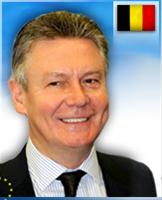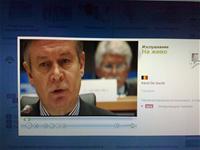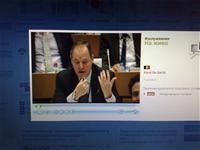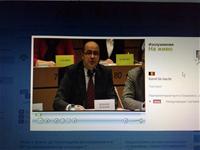Karel de Gucht: We must conclude the Doha Round negotiations
euinside, January 12, 2010
 The hearing of the Commissioner-designate for trade Karel de Gucht started a while ago. The former Belgian foreign minister and member of the European Parliament puts as his first priority in his written replies to the Parliament the conclusion of the Doha Round negotiations. The EU has for decades been one of the strongest supporters of the multilateral trade architecture and this is the reason why Mr. De Gucht intends to continue to support the creation of a global, effective and enforceable system of rules for open trade. According to the Belgian candidate, this would prevent the protectionist spiral seen in the Great Depression.
The hearing of the Commissioner-designate for trade Karel de Gucht started a while ago. The former Belgian foreign minister and member of the European Parliament puts as his first priority in his written replies to the Parliament the conclusion of the Doha Round negotiations. The EU has for decades been one of the strongest supporters of the multilateral trade architecture and this is the reason why Mr. De Gucht intends to continue to support the creation of a global, effective and enforceable system of rules for open trade. According to the Belgian candidate, this would prevent the protectionist spiral seen in the Great Depression.
Secondly, the former Belgian foreign minister points out the conclusion of free trade agreement with India, the ASEAN countries (South-Eastern Asia and the Pacific coast), Ukraine, Canada, the Mediterranean. In addition, according to Karel de Gucht, relations with key economic players, such as, for instance, the US, China, Japan or Russia also need to be reinforced.
The third priority, enlisted by the Belgian candidate, will be to ensure that trade policy becomes an integral part of this Commission's vision of Europe in 2020 and to be integrated in most European policies so that citizens can benefit from it too.
![]() 13:45 Karel de Gucht was asked very interesting questions and he replied well and relatively
13:45 Karel de Gucht was asked very interesting questions and he replied well and relatively  well prepared. One of the hardest questions was related to the conclusion of a trade agreement with Russia, as it is described in the second priority of the Belgian candidate. The question was whether such an agreement would mark the beginning of a new strategic partnership with Moscow and about the non-tariff barriers. The Commissioner-designate for trade answered a little bit eloquently regarding the agreement with Russia but recalled that when concluding agreements the EU always puts conditions.
well prepared. One of the hardest questions was related to the conclusion of a trade agreement with Russia, as it is described in the second priority of the Belgian candidate. The question was whether such an agreement would mark the beginning of a new strategic partnership with Moscow and about the non-tariff barriers. The Commissioner-designate for trade answered a little bit eloquently regarding the agreement with Russia but recalled that when concluding agreements the EU always puts conditions.
And regarding the non-tariff barriers, Karel de Gucht said that this was one of the most serious problems of international trade and that this issue can be solved best on a bilateral basis. De Gucht supports Russia's membership to the WTO (World Trade Organisation) but he added that this would depend on Russia itself. He said that currently Moscow was acting in contradiction to the responsibilities and commitments it took with the EU about its membership to the WTO. According to De Gucht, this is a very sensitive issue. However, he could not finish his reply because his 2 minutes for reply expired.
The Belgian candidate was also asked about his opinion what was the reason for the lack of success at the Doha Round so far and what his plans were to take the negotiations to a reasonable conclusion. According to De Gucht, 90% of the topics, discussed in the Doha Round would end with an agreement in 2011. Without mentioning any further details Karel De Gucht said that the main problem in these negotiations were the agriculture subsidies: "... it's just that there are still differences in opinion on some issues, predominantly in the field of agriculture". This is related to the requirement of the poor and developing countries the rich ones to remove their agriculture subsidies because this makes the farmers' production from the developing world uncompetitive on the markets of the developed nations like the US, the EU, Japan, Canada and the rest of the rich countries.
Asked whether the EU should not change its position in the Doha Round because of the new realities - the crisis, climate change, poverty, human rights, etc. the Commissioner-designate said that the EU had always supported development and that climate change was a very important issue which might best be addressed within the WTO.
 Karel de Gucht was asked a very interesting question by a British MEP about how the Commissioner-designate would manage to represent internationally the interests of 27 member states which have different interests and different levels of development. Mr. De Gucht explained that nevertheless the difficulties, the single representation in all cases was better than 27 representatives.
Karel de Gucht was asked a very interesting question by a British MEP about how the Commissioner-designate would manage to represent internationally the interests of 27 member states which have different interests and different levels of development. Mr. De Gucht explained that nevertheless the difficulties, the single representation in all cases was better than 27 representatives.
The Bulgarian MEP from ALDE Metin Kazak asked the candidate  about the link between the common foreign policy and the common trade and about the cooperation between Karel de Gucht and the new representative for external relations. According to the Belgian candidate, the common trade policy is an integral part of the common foreign policy, although it has its own peculiarities and specifics. He added, that there could not be a problem between him and Lady Ashton at least because until recently she was in his chair as a Commissioner for trade.
about the link between the common foreign policy and the common trade and about the cooperation between Karel de Gucht and the new representative for external relations. According to the Belgian candidate, the common trade policy is an integral part of the common foreign policy, although it has its own peculiarities and specifics. He added, that there could not be a problem between him and Lady Ashton at least because until recently she was in his chair as a Commissioner for trade.
![]() 13:53 The hearing of Karel de Gucht ended after a little more than 3 hours of questioning on many and different issues, related to international trade, anti-dumping measures, support for ailing industries, bilateral agreements and the combination of protection of interests and human rights violations by some countries with which the EU has or intends to conclude trade agreements. According to the chairmanship of the parliamentary Committee on International Trade, Mr. De Gucht appeared to be a very well prepared Commissioner-designate. The hearing was a remarkable example of European democracy - open questions, clear answers, the chairman of the Committee Vital Moreira from Portugal said at the end of the hearing. However, although most of the members of the Committee were satisfied with his presentation, there was criticism that he was not very convincing in explaining how he would bring to an end the Doha Round negotiations and what his plans were regarding anti-dumping measures.
13:53 The hearing of Karel de Gucht ended after a little more than 3 hours of questioning on many and different issues, related to international trade, anti-dumping measures, support for ailing industries, bilateral agreements and the combination of protection of interests and human rights violations by some countries with which the EU has or intends to conclude trade agreements. According to the chairmanship of the parliamentary Committee on International Trade, Mr. De Gucht appeared to be a very well prepared Commissioner-designate. The hearing was a remarkable example of European democracy - open questions, clear answers, the chairman of the Committee Vital Moreira from Portugal said at the end of the hearing. However, although most of the members of the Committee were satisfied with his presentation, there was criticism that he was not very convincing in explaining how he would bring to an end the Doha Round negotiations and what his plans were regarding anti-dumping measures.